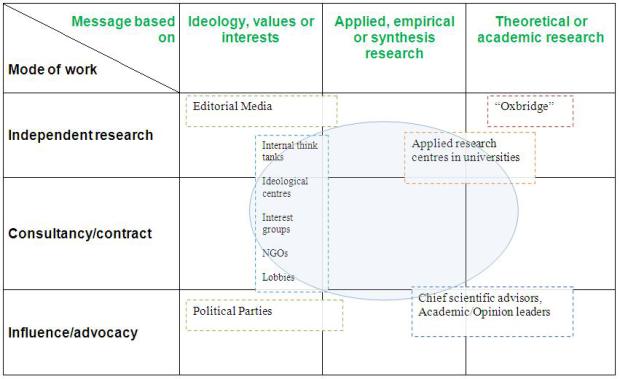I have been asked to present and facilitate a session on digital think tanks at the Think Tank Initiative’s global exchange in Cape Town next week. Nick Scott, Peter da Costa and Vaqar Ahmed will be co-facilitating. We will all try to write about our session and share our experience with you (So far: Digital strategy can support communications in think tanks. But can it also improve their research and management too?, 5 top tips for think tanks using social media, Social Media and think tanks: lessons from London Thinks). From the workshop agenda:
Moderator: Peter K.A. da Costa: Africa-based Consultant, Hewlett Foundation
Presenters:
Vaqar Ahmed: Sustainable Development Policy Institute (SDPI)
Enrique Mendizabal: Mendizabal Ltd, On Think Tanks blog
Nick Scott: Overseas Development Institute (ODI)Focus:
The workshop will articulate why think tanks should develop and implement a digital strategy. It will focus on ways in which digital approaches and tools can strengthen the three core business functions of think tanks – management, research and in particular communications. Participants will have the opportunity to update their knowledge on the state of the art, seek advice on the choices and trade-offs to be made given their specific external as well as internal contexts, and determine how best to pursue a digital strategy in their specific organizational context.
Objectives
- Provide a starting point for think tanks to begin thinking of a digital strategy that fits their context, capacity and institutional needs
- Help think tanks determine when, if and how they should take advantage of various digital tools and applications for management, research and communication of their work, internally as well as externally
I have taken on the role to set the scene (or make the case, if I can) for investing in a digital strategy. For it I need to first borrow from Nick Scott‘s definition of digital (but only a small section of a much longer one that he emailed to me (and in draft) -keep an eye on this blog for the long and proper version):
A ‘digital strategy’ should be a strategy that combines old Information Technology strategies with newer Online strategies and takes a holistic view of how computers connected to each other through the Internet and otherwise can support an organisation’s mission, vision and values
With this in mind: The key argument I want to make is that digital is not just about IT for communications. Digital-speak tends to be introduced to a think tank via the communication team or the IT department (or ‘guy’ -who remembers the company’s computer guy sketch? Nick Burns, the company’s computer guy was the one who knew how to use information technologies (computers) and succeeded in keeping the rest of the staff in the dark and afraid of all things IT). So not surprisingly we think that this is all about reaching broader and less informed audiences: the shallow and fickle twitterati.
Thinking of digital in this way limits what new technologies can do for a think tank. Hence our suggestion for this session is that we do not just limit our discussion to communications but also two other core internal think tank functions: management and research.
Digital tools can help these three internal functions and, what is more, they can do it in a way that support each other. For example, Twitter can be used to find information (research), disseminate it (communication), and keep team members connected and informed of a project’s activities (management). DropBox or Google Drive (the new version of Google Docs) can be used as an intranet for an organisation (management), to collaborate in the drafting of a study (research), and as a way of storing the public versions of key documents (communication).
It is when they work together that they achieve their potential for the organisation.
But not all think tanks can nor should do it all at once. Another important discussion we will have at the session is ‘what is appropriate for whom’? I have used the following table to describe the different functions that think tanks play and the spaces they fill in society (think tanks are somewhere in that shaded area):

It follows that think tanks that:
- More academic centres should stat by exploring how digital tools help them research
- More contract driven think tanks could first consider how to improve project management by using digital tools
- More advocacy oriented think tanks should look into digital tools for communications
We will explore this at the event.

